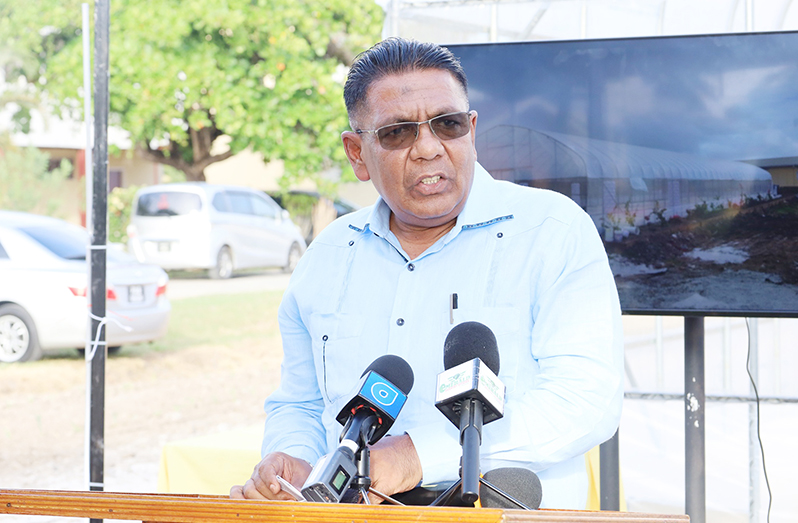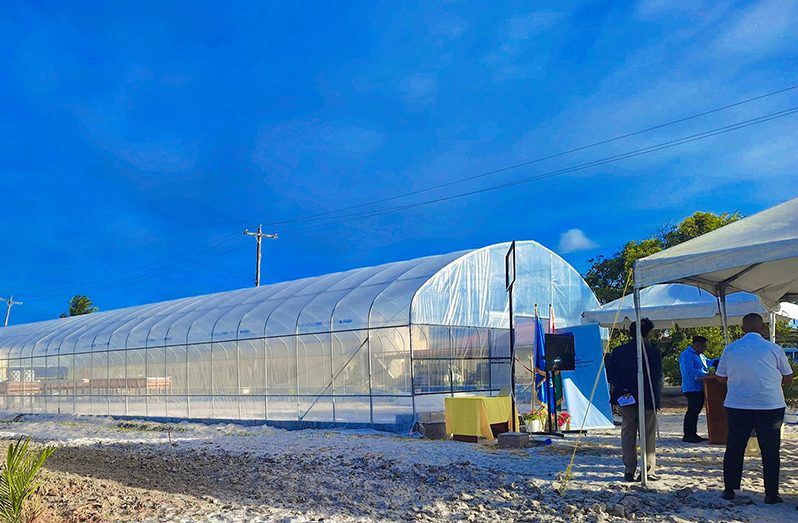GLOBAL Affairs Canada (GAC) made a recent donation of a cutting-edge greenhouse equipped with hydroponic and aquaculture systems to the Guyana School of Agriculture (GSA) in Mon Repos, located on the East Coast of Demerara. The purpose of this donation is to support the empowerment of women and youth by promoting the adoption of climate-smart agricultural technologies.
Speaking with the Guyana Chronicle, the Minister of Agriculture, Zulfikar Mustapha, explained that the initiative is significant in furthering Guyana’s strategic aim to achieve regional food security while empowering women and youth.
In accordance with his assertion, the government expresses its desire for the recipients to make use of the opportunities given to them and fully exploit the greenhouse’s potential.
“Like I mentioned on Wednesday at the opening ceremony, in addition to raising fish, we are also growing close to 5,000 plantlets. We are examining that kind of training in order to train the farmers. I also want to mention that I have requested that the (National Agricultural Research and Extension Institute (NAREI) and the Guyana Rice Development Board (GRDB) bring them to the institute so that they can become familiar with the best practices that we desire, and this is how precision agriculture should be discussed,” Minister Mustapha stated.
He also revealed that the black belly sheep, cut rose, and hydroponics programmes are just a few of the agricultural initiatives that Guyana has put in place to empower women and young people.

Furthermore, the Inter-American Institute for Cooperation on Agriculture (IICA), Global Affairs Canada (GAC), and other partners, along with the United Nations Development Programme’s innovative project Enabling Gender-Responsive Disaster Recovery, Climate, and Environmental Resilience in the Caribbean (EnGenDER), have made this regional initiative possible.
The EnGenDER project is in complete accordance with the national priorities outlined in the UN Framework Convention on Climate Change, the Paris Agreement, and Guyana’s Low Carbon Development Strategy (LCDS). The project is crucial for achieving the 2030 Sustainable Development Goals (SDGs), encompassing social, economic, and environmental dimensions.
Meanwhile, Canadian High Commissioner, Mark Berman, underscored Canada’s commitment to promoting the efficiency and climate resilience of agriculture to enhance food security and significantly reduce the industry’s environmental and agricultural impacts.
Berman argues that the utilisation of climate-smart agricultural methods is of utmost importance in safeguarding global food security and fostering a sustainable future.
The Canadian High Commissioner stated that Canada is committed to climate finance for climate-smart agriculture and food systems. It continues to implement programmes that prioritise smallholder farmers, particularly women and youth, to enhance their economic resilience and livelihoods through sustainable practices and improved resource accessibility.
The project has also worked to address the impact of climate change on agriculture, fisheries, health, tourism, water availability, energy, women, girls, and other vulnerable groups.
The Inter-American Institute for Cooperation on Agriculture (IICA) Representative in Guyana, Wilmot Garnett, explained, “We are training the students because agriculture is a business…This is the place for us to make sure that we do it. The second component is that we are using precision agriculture. The project we are building has special metres. We will be testing the water and plants regularly so that the students can understand the importance of precision and agriculture.”
The ceremony was attended by Gavin Ramnarain, the Chief Executive Officer of GSA, Sharon Peake, the Executive Director of the Caribbean Regional Development Programme at Global Affairs Canada, Dr. Gillian Smith, the United Nations Representative of the Food and Agriculture Organisation (FAO) in Guyana, and various other officials.



.jpg)








